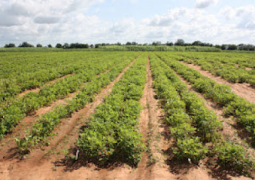
“Let me once again assure you of the continuous, strong commitment of the European Union to assist the people of The Gambia and the Gambian Government to address the common challenges ahead of us. We are dedicated to make progress again this year,” Mme Agnes Guillaud said recently at the inauguration ceremony of the Barra-Amdalai Road in North Bank Region.
Madame Guillaud said the inauguration of the road was a milestone for the many Gambians, who have become regular users of the Barra-Amdalai road, which was achieved about three years ago, as well as the large number of travellers and transporters to and from Senegal as “this road is a crucial link providing access from Banjul to Senegal and thereby further strengthening the bond between these two countries.”
She gave a synopsis of the assistance provided by the EU in The Gambia in the field of infrastructure.
“In the roads sector alone, the European Union financed a total of 76.5 million euros (more than four billion dalasis) for the rehabilitation and construction of 273 km of road in The Gambia. This is nearly 50% of the paved road network of this country,” she added.
She said these roads were financed from the 9th and 10th EDF – European Development Fund - from the Gambian and Senegalese National Indicative Programmes, as well as the ECOWAS Regional Indicative Programme, as the project also contributes to regional integration in West Africa.
She outlined the roads financed as the Madina Ba-Seleti Road (12.7); the Trans-Gambia Highway (25 km); the Soma-Basse road (193 km), Basse-Velingara (26km) and the Barra-Amdalai Road (19.9).
“All this would not be possible without the generosity of the 28-member states of the European Union,” she said.
“I think the many hardworking European taxpayers deserve recognition for their important contribution and support to the improvement of the road network in The Gambia.”
She said that another expected result under this project was to assist the Gambian government with the establishment of the National Roads Authority, and an operational and dedicated Road Fund.
“This is absolutely necessary in order to secure and maintain these investments in The Gambia,” she said, adding that she was pleased to see that the National Roads Authority has now been in a position to fulfill its core business.
“The European Union welcomes this approach, and is of the opinion that more predictability for the medium-term road maintenance budget is necessary to cover a well-established maintenance programme,” Mme Guillaud said, adding: “We are pleased to see that the budget allocated to the Road Fund has increased year after year, and has reached the highest amount ever in 2014.
She also underscored the necessity of weighing stations for axle load control in order to limit the weight of trucks crossing the country.
“In fact, this is also a recommendation from ECOWAS since it is well known that a road will degrade very quickly if such control mechanisms are not being implemented,” she said.
The roads, she added, will be used by an increasing number of trucks from Senegal, Guinea Bissau, Guinea Conakry, and other neighbouring countries; hence “it is of paramount importance to control this parameter to maintain the roads.”



